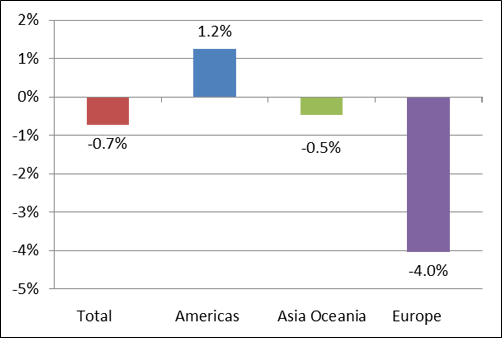OECD energy production hits record high, but consumption and CO2 emissions fall

Newest IEA statistics detail decoupling of member countries’ economic growth from carbon pollution
Even as total OECD energy production rose 4% in 2014 to a record high, energy consumption among the member countries fell, as did CO2 emissions from fuel combustion, new IEA data reveal.
The latest detailed official statistics for the 34 countries in the Organisation of Economic Co-operation and Development add to the IEA finding that world energy-related CO2 emissions held steady in 2014 despite economic growth, the first such decoupling on a worldwide basis in the 40 years the Agency has provided information on emissions. The IEA issued a preliminary assessment earlier this year that the historic shift continued at a global level through 2015.
The decoupling is particularly acute among OECD countries, where emissions fell 1.4% in 2014, to 11.9 gigatonnes. That is only slightly more than OECD emissions in 2009 despite the countries’ 10% economic growth over the period. The leading factor in the recent decoupling is a decline in the energy intensity of OECD countries’ economies, which is the result of greater energy efficiency and warmer seasons among other factors. Another contributor is reduced emissions per kilowatt-hour in electricity generation, the sector responsible for two-fifths of energy-related CO2 in OECD.
CO2 emissions per kWh of electricity generation

That reduction in generation emissions is partly the result of a 9.7% surge in the share of renewables other than hydropower, referred to in the below chart as Other. That increase lifted the share of electricity generation from those renewables, made up of geothermal, solar, wind, tide, biofuels, waste and heat, to a full 10%.
OECD electricity generation mix: 2014

As a result, total renewables generation reached a record high.
OECD electricity generation from renewables: 1971-2014

By fuel, oil remained the largest source of emissions for OECD countries. But while increased US and Canadian oil production helped drive higher energy production in 2014, OECD countries used less energy overall. A relatively warm European led final energy consumption to decline 0.7% after a 2% increase in 2013.
OECD Total Final Consumption: 2013-14 change

The combination of higher production and lower demand resulted in another year of declining OECD energy imports, which in 2014 fell to levels last seen in 1995.
OECD energy supply: 1971-2014

* = Total primary energy supply
To download the IEA summary Recent Trends in OECD: Energy and CO2 emissions (2016 preliminary), click here.
To purchase the full set of IEA statistics underlying the summary, click here. To learn more about IEA energy statistics and view the latest IEA statistics news, click here.
Source: © 2016 OECD/IEA

